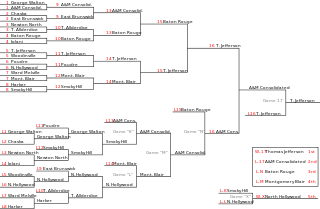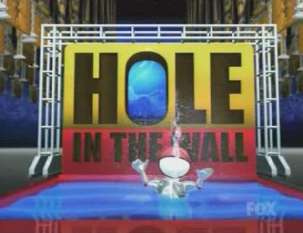
The Weakest Link is a British television quiz show, mainly broadcast on BBC Two and BBC One. It was devised by Fintan Coyle and Cathy Dunning and developed for television by the BBC Entertainment Department. The game begins with a team of nine contestants, who take turns answering general knowledge questions within a time limit to create chains of nine correct answers in a row. At the end of each round, the players then vote one contestant, "the weakest link", out of the game. After two players are left, they play in a head-to-head penalty shootout format, with five questions asked to each contestant in turn, to determine the winner.
Who Wants to Be a Millionaire? is an international television game show franchise of British origin, created by David Briggs, Mike Whitehill and Steven Knight. In its format, currently owned and licensed by Sony Pictures Television, contestants tackle a series of multiple-choice questions to win large cash prizes in a format that twists on many game show genre conventions – only one contestant plays at a time, similar to radio quizzes; contestants are given the question before deciding whether to answer, and have no time limit to answer questions; and the amount offered increases as they tackle questions that become increasingly difficult. The maximum cash prize offered in most versions of the format is an aspirational value in local currency, such as one million pounds in the UK or 75 million rupees in India.
A tournament is a competition involving at least three competitors, all participating in a sport or game. More specifically, the term may be used in either of two overlapping senses:
- One or more competitions held at a single venue and concentrated into a relatively short time interval.
- A competition involving a number of matches, each involving a subset of the competitors, with the overall tournament winner determined based on the combined results of these individual matches. These are common in those sports and games where each match must involve a small number of competitors: often precisely two, as in most team sports, racket sports and combat sports, many card games and board games, and many forms of competitive debating. Such tournaments allow large numbers to compete against each other in spite of the restriction on numbers in a single match.
Remote Control is an American TV game show that ran on MTV for five seasons from 1987 until 1990. It was MTV's first original non-musical program and first game show. A concurrent syndicated version of the series ran during the 1989-90 season and was distributed by Viacom. Three contestants answered trivia questions on movies, music, and television, many of which were presented in skit format.
Takeshi's Castle is a Japanese game show that aired between 1986 and 1990 on the Tokyo Broadcasting System (TBS). It features the Japanese comedian Takeshi Kitano as a count who owns a castle and sets up difficult physical challenges for players to get to him.
A single-elimination, knockout, or sudden-death tournament, is a type of elimination tournament where the loser of each match-up is immediately eliminated from the tournament. Each winner will play another in the next round, until the final match-up, whose winner becomes the tournament champion. Each match-up may be a single match or several, for example two-legged ties in European sports or best-of series in North American pro sports. Defeated competitors may play no further part after losing, or may participate in "consolation" or "classification" matches against other losers to determine the lower final rankings; for example, a third place playoff between losing semi-finalists. In a shootout poker tournament, there are more than two players competing at each table, and sometimes more than one progresses to the next round. Some competitions are held with a pure single-elimination tournament system. Others have many phases, with the last being a single-elimination final stage, often called playoffs.

A double-elimination tournament is a type of elimination tournament competition in which a participant ceases to be eligible to win the tournament's championship upon having lost two games or matches. It stands in contrast to a single-elimination tournament, in which only one defeat results in elimination.

Repechage is a practice in series competitions that allows participants who failed to meet qualifying standards by a small margin to continue to the next round. A well known example is the wild card system.

Gunge as it is known in the United Kingdom, or slime as it is known in the United States and most English-speaking areas of the world, is a thick, gooey, yet runny substance with a consistency somewhere between that of paint and custard. It has been a feature on many children's programs for many years around the world and has made appearances in game shows as well as other programming. While gunge mostly appears on television, it can also be used as a fundraising tool for charities, youth and religious groups. Gunge tanks have appeared at nightclubs and Fun Days. The British charities Comic Relief and Children in Need, supported by the BBC, have used gunge for fundraising in the past. In the U.S., slime is sometimes associated with Nickelodeon, even having several game shows revolving around it, such as Slime Time Live.

Hole in the Wall is an American game show that has aired in two versions on American television.
A muster is an event pertaining to fire/rescue services. It is held in a central area such as a park and has many activities for fire department members and sometimes other community members. A muster typically revolves around a firematic competition between fire companies from around the surrounding area. Other attractions include a flea market, live music, food, demonstrations, apparatus judging, vehicle shows and contests.

Total Wipeout is a British game show, hosted by Richard Hammond and Amanda Byram, which first aired on the BBC on 3 January 2009. In each episode, contestants competed in a series of challenges in an attempt to win £10,000. These challenges were based in large pools of water or mud and generally involved large assault courses that contestants had to cross. These were gradually eliminated over four rounds until one contestant remained, who won a £10,000 cash prize and a trophy.

American Ninja Warrior is an American sports entertainment reality show based on the Japanese television reality show Sasuke, which also serves as a successor of American Ninja Challenge. It features a set of obstacle courses in various cities, which contestants attempt to conquer. The obstacle courses are divided into Qualifiers courses, Semifinals courses, and a four-part Finals course which is based at Las Vegas Strip. The contestant who finishes all the courses in the fastest time wins a cash prize of $1,000,000. Starting with season 10, if one remaining contestant fails on any of Finals course parts, but has completed it more than the others in the fastest time, he wins a consolatory $100,000 prize. The show is hosted by Matt Iseman and Akbar Gbaja-Biamila. To date, only Isaac Caldiero, Drew Drechsel, and Vance Walker have won the main cash prize. Furthermore, Geoff Britten and Daniel Gil are the only two runners-up who have achieved Total Victory.

101 Ways to Leave a Gameshow is a British game show produced by Initial for the BBC hosted by Steve Jones and Nemone. On each episode, eight contestants compete for a £10,000 prize by picking the correct answers to general knowledge questions, all the while standing on a tower configured for various stunts. Competitors who pick incorrect answers are eliminated from the show in a variety of different ways, usually involving a drop into a large pool of water at the base of the tower. The show made its debut on BBC One on 10 July 2010 and ended on 28 August 2010. An American version hosted by Jeff Sutphen premiered on ABC on 21 June 2011.
Underwater orienteering is an underwater sport that uses recreational open circuit scuba diving equipment and consists of a set of individual and team events conducted in both sheltered and open water testing the competitors' competency in underwater navigation. The competition is principally concerned with the effectiveness of navigation technique used by competitors to swim an underwater course following a route marked on a map prepared by the competition organisers, a compass and a counter meter to measure the distance covered. The sport was developed in the Soviet Union during the late 1950s and is played mainly in Europe. It is known as Orientation Sub in French and as La Orientación Subacuática in Spanish. Historically, the sport has also been known as Technical Disciplines.
Japanizi "Going, Going, Gong!" ("ゴーイング、ゴーイング、ゴング!") is a Canadian children's physical game show with a Japanese motif where contestants compete with a teammate against other teams as they tackle obstacles and challenges to test their mental capabilities, strength, endurance, and smarts. The series first aired on YTV starting 5 November 2013 and in the United States on Disney XD as of 4 November 2013.
The Grudge Match is a 1991 syndicated television game show that invited feuding people to settle their issues in a boxing ring using various implements of revenge.
L'eredità is an Italian Rai 1 game show currently hosted by Marco Liorni. It premiered on 29 July 2002. From 29 July 2002 to 10 June 2006, it was hosted by Italian presenter Amadeus. He was succeeded by Carlo Conti, who hosted the show until 14 April 2014, when he was replaced by Fabrizio Frizzi. Frizzi hosted until 23 October 2017, when he became ill during the taping of the next show and was taken to the hospital. Carlo Conti substituted for Frizzi from 30 October 2017 to 15 December 2017, and he hosted the special episode in tandem with Fabrizio Frizzi when the latter returned to host the quiz. On 16 December 2017, Fabrizio Frizzi resumed hosting the show by himself until 25 March 2018. The next day, Frizzi died of a brain haemorrhage. Following a hiatus due to Frizzi's death, the game returned from 3 April 2018 until the end of the season with the host Carlo Conti. Flavio Insinna presented the show from 24 September 2018 until 2023.

King of the Nerds is a British reality competition series co-produced by Electus and Objective Productions. Based on the American series of the same name, the show features nerds and geeks competing in challenges for a £15,000 prize and the title of "King of the Nerds". It is hosted by television presenter and writer Konnie Huq. The series premiered on Sky 1 on 12 July 2015.
Weakest Link is a television game show which first appeared in the United Kingdom on BBC Two on 14 August 2000 and originally ended on 31 March 2012 when its host Anne Robinson completed her contract. The original British version of the show is still aired around the world on BBC Entertainment and domestically on Challenge. The game begins with a team of eight or nine contestants who take turns answering general knowledge questions within a time limit to create chains of correct answers in a row. At the end of each round, the players vote one contestant, "The Weakest Link", out of the game. Once two players are left, they play in a head-to-head contest, with five questions asked to each contestant in turn, to determine the winner.







